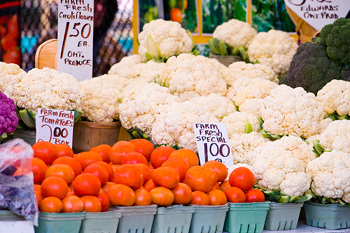Last October, Pollan wrote an open letter to Obama in The New York Times Magazine, citing how the presidential candidate could put the nation’s food system on the right track if he became president. In short order, an Obama aide phoned requesting a summary, but Pollan declined, basically saying if the story could have been shorter, it would have been. Undeterred, Obama quoted Pollan’s article at length in an interview with a reporter from Time magazine.
At the consumer level, Pollan is changing the way people eat, first with Omnivore’s Dilemma, which stayed on The New York Times best-seller list for 91 weeks. In his latest book, In Defense of Food: An Eater’s Manifesto, he coined a phrase, summarizing the book’s message: “Eat food, not too much, mostly plants” (Perhaps Obama should have asked for a seven-word summary.) Anyway, the phrase has legs and is working its way onto T-shirts, coffee mugs and the bottom of e-mail signatures. Some Pollan fans have created a web petition, appealing to Obama to appoint Pollan as secretary of agriculture (www.thepetitionsite.com).
Pollan’s shorthand summary of the book is like a semaphore for eating whole, local, mostly vegetarian foods in lesser amounts (like the French, eat less, but more sensually). But the background history, politics, culture and science woven into the book are what makes you sit up. “Food” in his mind does not include “food-like substitutes,” the 17,000 new ones that appear on grocery shelves every year.
I had a chance to sit down with Pollan when he was in
“I spent two years looking at the whole question of what we really know about diet and health,” said Pollan, who lives in
“Usually, the deeper you drill into questions like that, the more complicated and ambiguous things become and it’s not as simple as you thought. With this question, the opposite was true. The further I went, the simpler it got. After two years of research, I had seven words: Eat food, not too much, mostly plants.”
That’s his prescription for health and well-being.
When Pollan talks about food, he means the kind our grandparents and great-grandparents used to eat.
“The modern way of eating leads to chronic diseases. As soon as you get away from the Western diet, you are going to be healthier.
It’s the elephant in the room that the food industry would rather not pay attention to,” he says.
In his book, he raises the irony of North American orthoexics, referring to an unhealthy obsession with healthy eating.
“The chronic diseases that now kill most of us can be traced directly to the industrialization of our food,” he says in the book.
“The rise of highly processed foods and refined grains; the use of chemicals to raise plants and animals in huge monocultures; the super-abundance of cheap calories of sugar and fat produced by modern agriculture; and the narrowing of the biological diversity of the human diet to a tiny handful of staple crops, notably wheat, corn and soy.
These changes have given us the Western diet that we take for granted: lots of processed foods and meat, lots of added fat and sugar, lots of everything — except vegetables, fruits and whole grains.”
Humans, he says, have adapted to a multitude of diets around the world. The Western diet, however, is not one of them and we have higher rates of cancer, cardiovascular diseases, diabetes and obesity than people on culturally traditional diets. By the 1960s, he says, it was all but impossible to sustain our grandparents’ way of eating. Synthetics had entered the food chain, as had meats raised on grains (not pastures) and pharmaceuticals.
The thing is, the big profits are made in cheap, easy, processed food. “It’s easier to slap a health claim on a box of sugary cereal than on a raw potato or carrot.”
However, those health claims often crumble like vanilla wafers. “The low-fat campaign,” he says, was an abject failure after 30 years of linking dietary fat with heart disease and cancer and weight gain.
“It is now increasingly recognized that the low-fat campaign has been based on little scientific evidence and may have caused unintended health consequences,” he says in his book. He points out that the human brain is about 60 per cent fat and every neuron is sheathed in a protective layer of fat.
Ironically, Americans got fat on low-fat diets because they turned to carbs to avoid fat.
There’s evidence that carbs interfere with insulin metabolism in ways that increase hunger and promote overeating and, thus, fat storage in the body.
Grandma food, the simple, unadulterated food made of vegetables, fruits and grains, can’t be broken down into reductionist science, he says.
These whole foods are a wilderness of chemical compounds and interactions that science doesn’t understand, just like the workings of our digestive system which has as many neurons as our spinal column.
“But,” he says, “you don’t need to fathom a carrot’s complexity to reap its benefits.”
Pollan is optimistic. “There’s a revolution going on and I’m very encouraged. The fastest growing segment [in the food sector] are farmers’ markets and organics. It’s important on the health level because there are no processed foods at farmers’ markets. Anything that gets people to cook more tends towards a healthier diet.”
And that, he says, is happening despite $32 billion a year spent marketing processed foods in the
Sorry for the bad fit - full story - vancouversun.com
Click here to listen to the interview with food author Michael Pollan
Related Resources:


